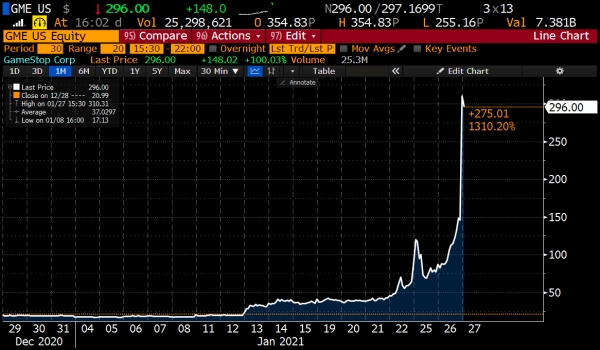Gamestop: WHY, really, did it happen?
There are at least a couple of reasons. But only one surely matters.

Last week, I tried to summarize WHAT happened with Gamestop, and who REALLY won. Today, as promised, I share a couple of the larger, “structural” reasons WHY GameStop happened. And no, they don’t include the availability of no-fee trading platforms like Robinhood. That was just a technological enabler.
Gamestop? If (young) people were just going out more…
Scott Galloway said that one of the reason why Gamestop happened is that “bored men are the most dangerous people in the world and a lot of young men are at home and, quite frankly, not having sex and developing relationships with others that inhibit some of their instincts to gamble… I think if people were going out more, dating more, working more, they wouldn’t need to hit the dopamine bag that is Robinhood”.
On a similar note, I have also seen arguments that “trading stocks is the most common use for the US government pandemic stimulus cheques in almost every age bracket."
If all this is at least partly true, and in my opinion it is, the Gamestop affair is also another, significant symptom of how big the malaise felt by large parts of the population really is.
The other, real “why”: bets all the way down
The “nervous young males” thing may be completely bogus, but the other reason why GameStop could happen surely exists, and is the real problem. It is that what once was “finance” to increase wealth has been reduced to mere, but extremely unbalanced bets, all the way down:
“Stock markets are fundamentally a way of making bets, including bets on the outcome of other peoples' bets, and bets on the outcomes of those bets."
“All this complexity creates lots of exploitable opportunities. Some of these opportunities are considered legitimate and are given respectable names like “arbitrage.” Others are considered illegitimate, and are called disreputable things like “stock manipulation… the difference isn’t about any objective standard, but rather, about power."
“The strategies of powerful people are legit, while the strategies of their would-be dethroners are not legit. Sometimes, even outright frauds are OK if they’re done by people with enough power."
Regulation? Why?
When the Gamestop circus started, many celebrated it as a long overdue “democratization of investing, through no-fee trading”. In the same hours, Wall Street’s “old guard” was forced to reckon with how that same democratization was affecting the dynamics of the “market”. Unsurprisingly, calls for “better regulation”ensued. The point is, does “regulation” really make sense here, or solve anything that does make a difference?
What is really stupid is ALWAYS really stupid
In those days of January I have also seen advocates of a fairer, really peer to peer economy exult for the “democratization” that Gamestop represented. I don’t understand why they should exult, just like I don’t understand the calls to “regulate” the practices exploited by the Reddit investors, and whoever manipulated them. Gamestop was bets over bets over bets. What is the point of regulating, or democratizing, something intrinsically stupid and harmful, whoever does it?
Just forget ethics for a moment, let’s only worry about making money, bottom lines, and personal freedom, which is also personal responsibility. Even if those were the only values, any rational society should keep investing and betting as separate as possible.
Investments, and finance in general, are tools to increase profits in and from the real economy, even accepting some risk, of course.
Betting, instead, is something one does exclusively for him or herself, out of purely personal needs, be they playfulness, incoscience, dopamine addiction, or desperation.
That’s why, in any sane world, investments and betting should never happen in the same place, or with the same kind of money. Regardless of ethics, just out of rationality. Betting (including that most stupid, 2.0 form pompously called high-frequency trading”) is just bad for real business.
Gamestop’s lesson: just refuse betting parlors INSIDE stock exchanges
Gamestop doesn' tell that short squeezes should be better regulated. It tells that any “bet on bets on bets…” on the real economy should be forbidden.
Want to invest, that is risk yours, and why not, other people’s real money and lives (think pension funds…) on some concrete success of some company, or State? And maybe borrow some money to do that, and nothing more? Cool, the Stock Exchange is down there.
Need to play with money, just to feel better? Cool again, but the betting parlor is in the opposite direction, and will only accept real money that you already own”, and only for bets on horse races, football matches, celebrities weddings, and other events that are just as irrelevant, in the big picture. Not on other people’s livelyhoods.
Forget regulation. The Gamestop farce happened because we allow the mixing of betting parlors and Stock Exchanges, and will happen again, being every time as stupid and wasteful as this one, until they remain mixed.
Who writes this, why, and how to help
I am Marco Fioretti, tech writer and aspiring polymath doing human-digital research and popularization.
I do it because YOUR civil rights and the quality of YOUR life depend every year more on how software is used AROUND you.
To this end, I have already shared more than a million words on this blog, without any paywall or user tracking, and am sharing the next million through a newsletter, also without any paywall.
The more direct support I get, the more I can continue to inform for free parents, teachers, decision makers, and everybody else who should know more stuff like this. You can support me with paid subscriptions to my newsletter, donations via PayPal (mfioretti@nexaima.net) or LiberaPay, or in any of the other ways listed here.THANKS for your support!